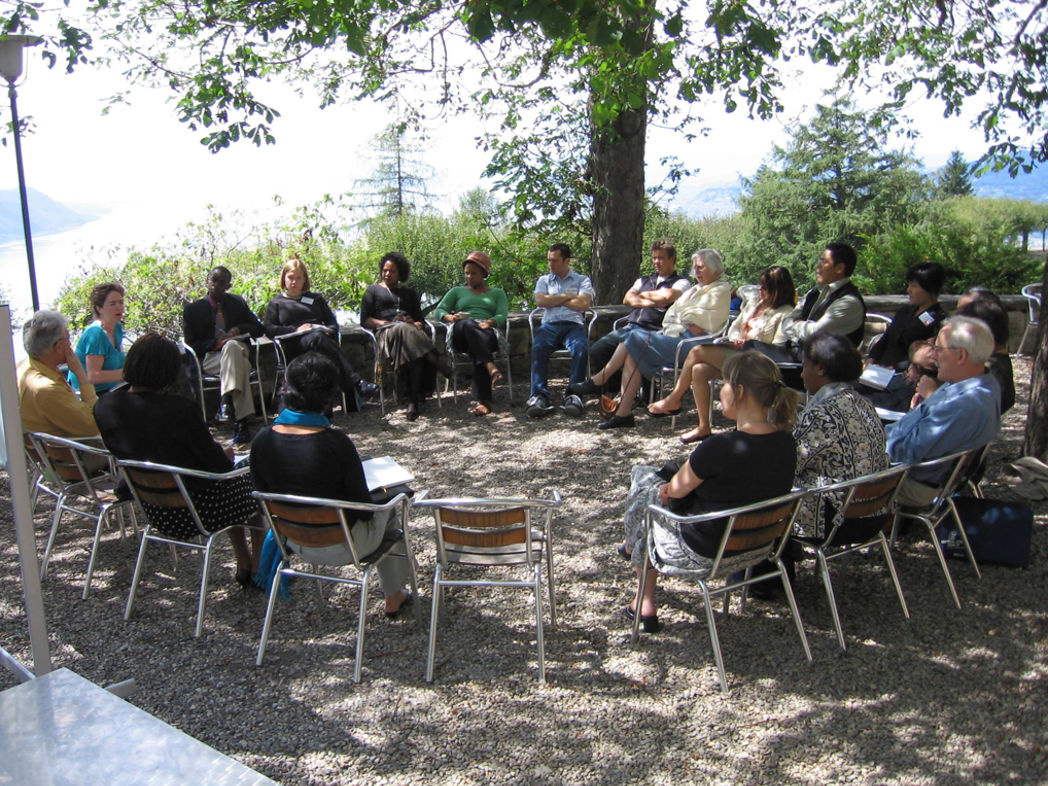Convening people is easy compared to breaking harmful colonial habits once we’re together. Whenever I am asked to facilitate an Indigenous and non-Indigenous community dialogue, I always first consider these questions:
- 1How has colonialism impacted this issue? For example, what attitudes, behaviours and systems were (and are) in place to create this issue? What is the impact today?
- 2What questions will help people stop replicating the past and innovate a new pathway forward?
- 3How can I facilitate in a way that will create space to interrupt old habits of interacting that no longer serve us as we create new pathways forward together?
Recently, Initiatives of Change Canada asked me to facilitate an Intergenerational Indigenous Dialogue as part of their Circles on Indigenous Worldviews webinar series.
When I heard the guest speakers were Lewis, Jacquelyn and Hunter Cardinal (a father & siblings trio), I jumped at the opportunity. Individually, they are each phenomenal in their own right. Together they are unstoppable in their commitment and innovation to regenerate and amplify Indigenous voices, knowledge and ways of being—all with the ultimate goal of reconciliation.
When I heard the guest speakers were Lewis, Jacquelyn and Hunter Cardinal (a father & siblings trio), I jumped at the opportunity. Individually, they are each phenomenal in their own right. Together they are unstoppable in their commitment and innovation to regenerate and amplify Indigenous voices, knowledge and ways of being—all with the ultimate goal of reconciliation.

Photo of Global Indigenous Dialogue where Jessie, Lewis, Jacquelyn and Hunter first met (Lewis was the chair and invited Jessie to facilitate a session in Switzerland).
To create a safe space, after a fabulous land acknowledgement and introduction of our esteemed speakers, we started off by acknowledging the impact of colonialism on intergenerational Indigenous relationships (i.e. residential schools and much more). We then talked about the imperative to engage and foster Indigenous intergenerational relationships as an essential ingredient in any efforts to create the conditions for reconciliation.
The Impacts of Colonialism
In my view, we are at a pretty exciting threshold. More people are aware of the impact of colonialism and, with that, there’s more appetite to innovate a new pathway forward. I often see these moments as liminal times; we know what we are leaving behind, yet we are not quite sure where we want to get to.
To move forward in a new way, I find it very helpful to explore 3 main questions:
To move forward in a new way, I find it very helpful to explore 3 main questions:
To listen to the genius of Lewis, Jacquelyn and Hunter Cardinal, listen to this snippet of their answers to these questions:
The tricky thing about facilitating Indigenous and non-Indigenous dialogues is that colonial habits of interacting surface in the process. These patterns are to be expected. After all, we don’t unlearn a 150+ year habit overnight. As a facilitator, the challenge is how to create a safe container to prepare for this scenario and address it.
Disrupting Harmful Colonial Habits
These are three ways I prepare and address these challenging habits:
- 1I name the habit we are leaving behind and come to an agreement with the group about a new way of interacting at the very beginning. In this particular community dialogue, I addressed the habit of listening to Indigenous stories and then either crying or sharing your own success story. I invited people to listen for what touched them and, as a result, what they will do about it. In this way, we set the space for a culture of reciprocity.
- 2Before we start, I invite people to some guiding principles in our time together. One of them is to give each other a “soft landing”. What I mean by this phrase is that we are likely to make mistakes unintentionally. I then ask permission, if a mistake is made, may we slow down the conversation and take a moment to address it through providing a soft landing. This means we assume the other person just needs more information as a first step in problem solving before we move onto other strategies to resolve the issue.
- 3If / when a mistake is made, I gather my courage and pause the conversation. I then ask, “May I give you a soft landing?” If the person says yes, I name the habit as something that has been learned for the last 150 years and invite them to consider a new pathway forward. This leads to a dialogue that is very much geared to the people in the room.
During this particular dialogue, I made a mistake! During the Q&A, a non-Indigenous Australian audience member shared a story that included talking about “our Aboriginal people.” And guess what, I was so focused on ensuring we stayed in the time frame allocated to Q&A, I did not interrupt this habit of talking about Indigenous peoples as a possession - “our Aboriginal people”. As a facilitator, I reflected on my mistake and realized I did not fully set up expectations of the soft landing. As a result, we did not have an agreed upon way of handling it when a mistake happened.
Since then, I have made a commitment to do better. Part of that commitment is sharing my mistake with others so that together we can gather our courage to address mistakes as they happen, including our own.
P.S. To see the whole video, visit: https://youtu.be/mCnBzcejDM0
Since then, I have made a commitment to do better. Part of that commitment is sharing my mistake with others so that together we can gather our courage to address mistakes as they happen, including our own.
P.S. To see the whole video, visit: https://youtu.be/mCnBzcejDM0
